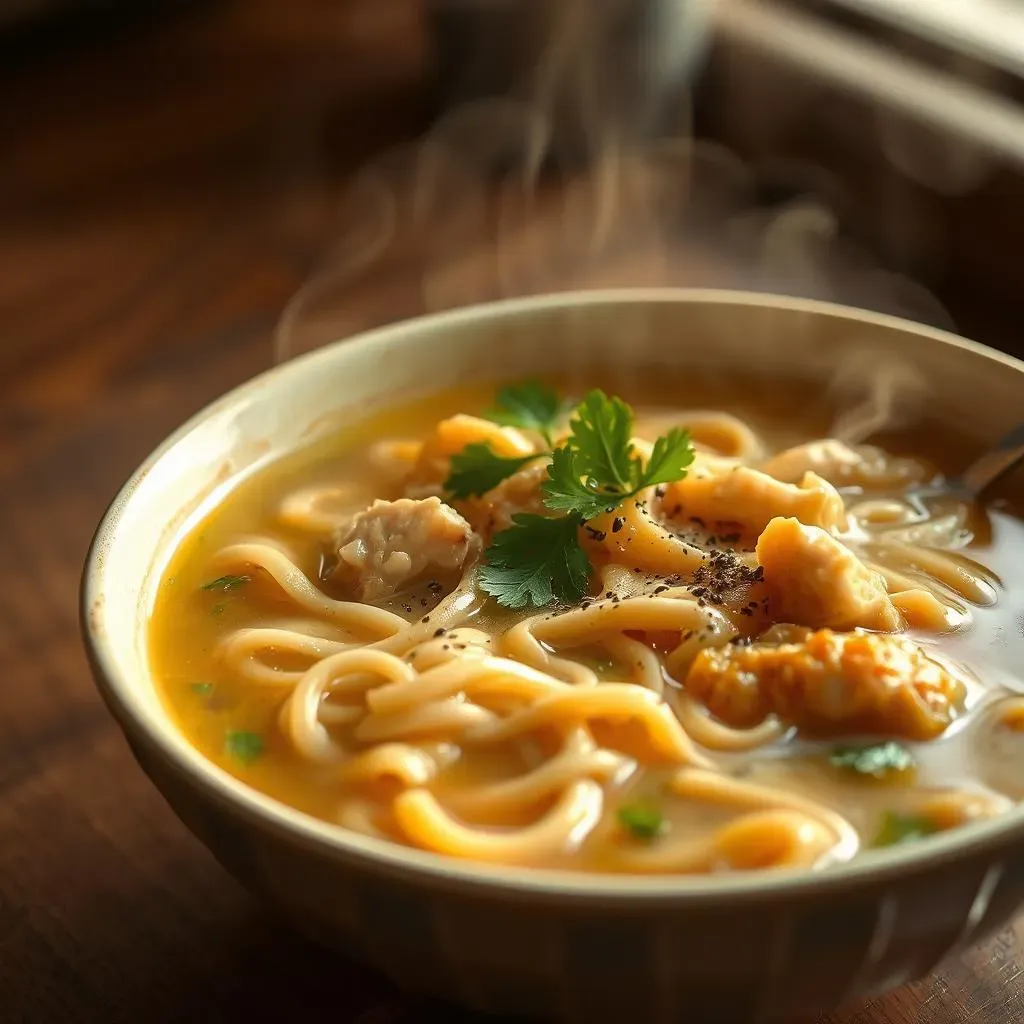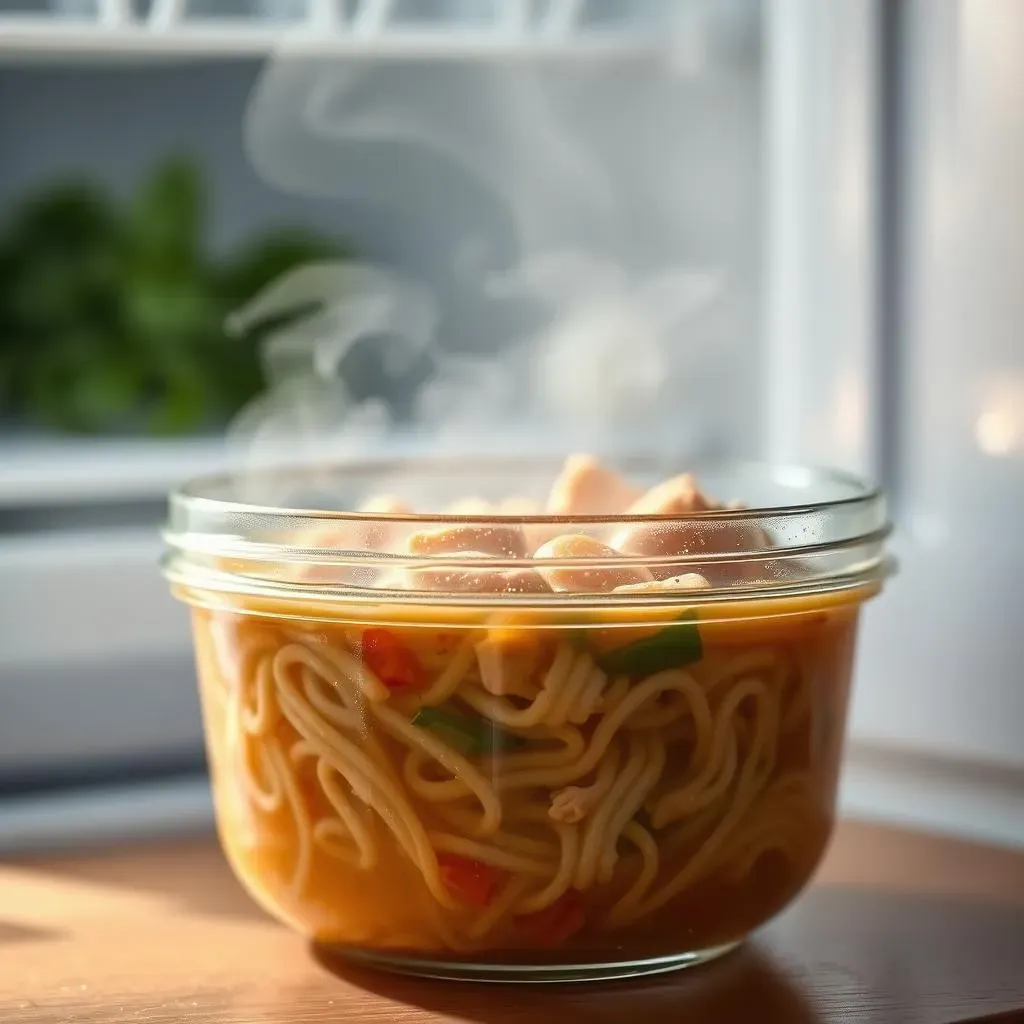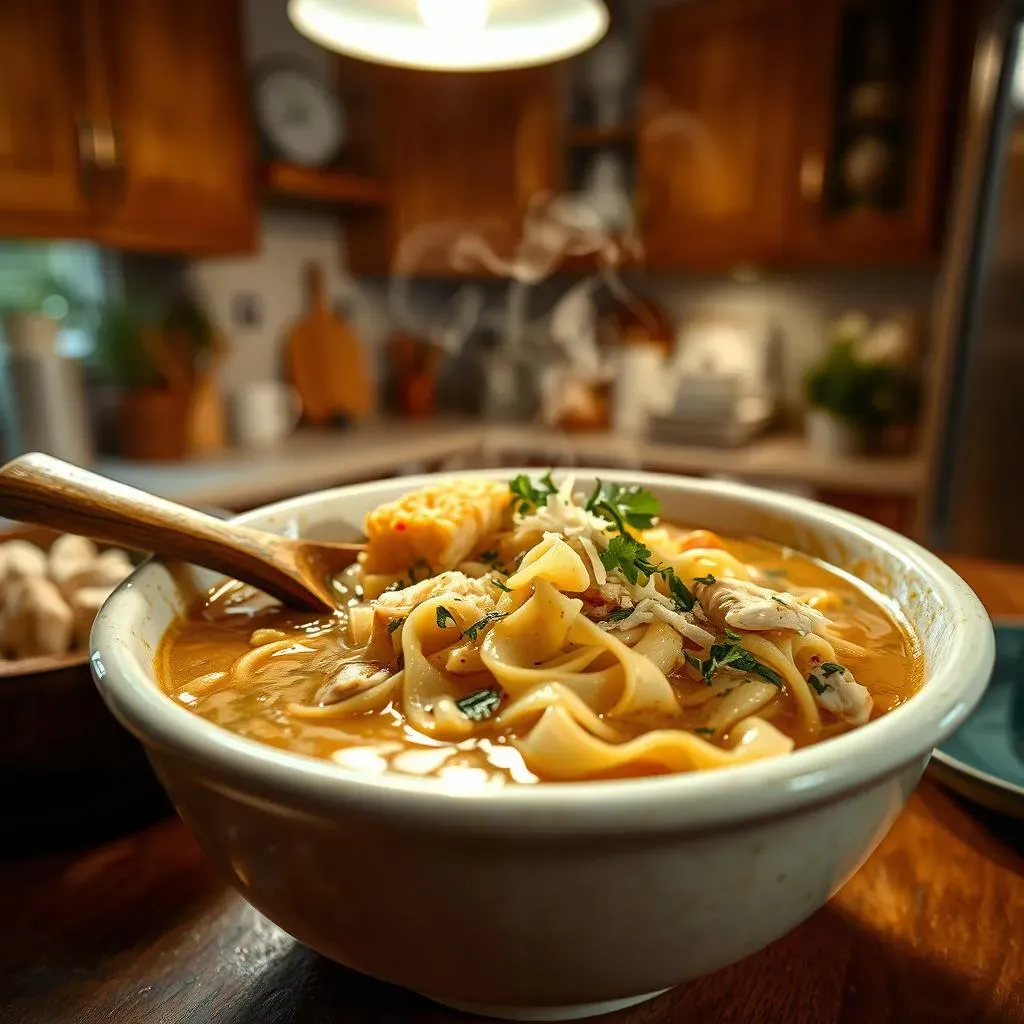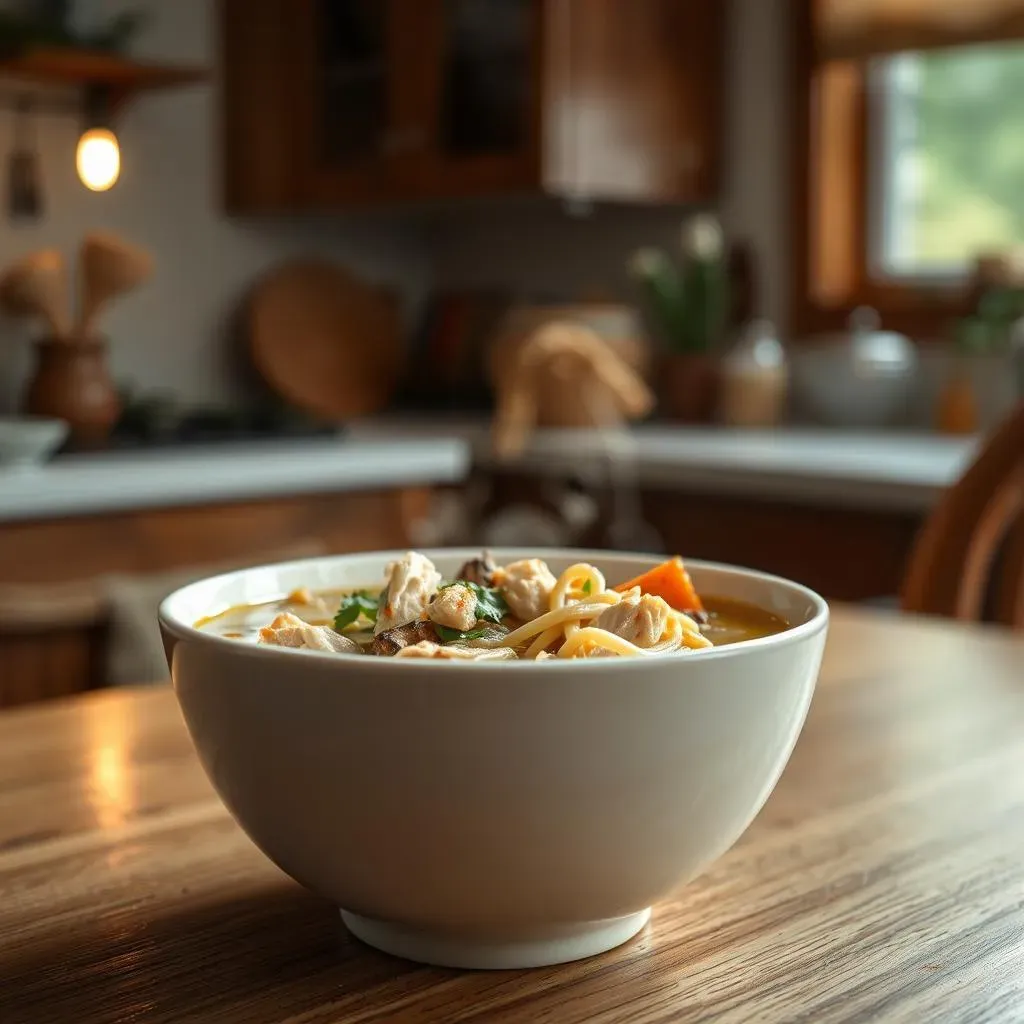Table of Contents
Picture this: you’ve just made a big pot of comforting chicken noodle soup, the aroma filling your kitchen. You’ve had your fill, and now, you're staring at the leftovers. A question pops into your head: does chicken noodle soup need to be refrigerated? It's a valid concern. After all, nobody wants a tummy ache or to waste perfectly good soup. This isn't just about avoiding food poisoning; it's also about preserving that delicious, homemade flavor. In this article, we'll explore the ins and outs of storing your precious chicken noodle soup. We will cover the expected lifespan of your soup, the best refrigeration methods, and what signs to watch out for to ensure your soup remains safe and tasty. We'll also look at how different ingredients and even freezing can play a role. So, let's get to the bottom of this and make sure your soup is always ready for a cozy meal.
How Long Does Homemade Chicken Noodle Soup Last?

How Long Does Homemade Chicken Noodle Soup Last?
Alright, so you've whipped up a batch of homemade chicken noodle soup, and it's seriously delicious. But now, the big question: how long can you keep it around before it turns into a science experiment? Generally, homemade chicken noodle soup is good in the fridge for about 3 to 4 days, but that's not a hard and fast rule. Think of it like this: your soup's ticking clock starts the moment it's done cooking. It's all about managing that time properly to keep it safe and tasty.
Best Ways to Store Chicken Noodle Soup in the Fridge

Best Ways to Store Chicken Noodle Soup in the Fridge
Cool It Down First
so you can't just chuck that steaming pot of soup straight into the fridge. That's like trying to cool down a car engine by throwing it in a snow bank – it's not going to work well. You need to let your soup cool down a bit first. Why? Because putting hot food in the fridge can raise the overall temperature inside, which isn't ideal for your other food. Plus, it can lead to condensation, making your soup watery and less appetizing. So, give it some time, let the steam subside, and get it to room temperature before you put it away.
Airtight Containers Are Your Friends
Now that your soup is cooled down, it needs a proper home. Think of it like this: you wouldn't leave your phone out in the rain, would you? Well, your soup needs protection too. Opt for airtight containers. These are your trusty sidekicks in the battle against spoilage. They keep out unwanted bacteria and nasty odors that can creep in from other fridge items. Glass or BPA-free plastic containers work great. Make sure they're clean, dry, and ready to seal up that liquid gold. Don't just throw it in a bowl with some plastic wrap – that's not going to cut it. A proper seal is key to keeping your soup fresh and delicious.
Here's a quick guide:
- Cool First: Let the soup cool to room temp before refrigerating.
- Airtight Seal: Use proper containers with tight-fitting lids.
- Don't Overfill: Leave a bit of space at the top for expansion.
- Label It: Write the date on the container.
Spotting Spoiled Chicken Noodle Soup: What to Look For

Spotting Spoiled Chicken Noodle Soup: What to Look For
The Smell Test: Trust Your Nose
so you've got your soup in the fridge, but how do you know if it's still good? First things first: give it a sniff. If it smells off, like sour or funky, that's a major red flag. Fresh chicken noodle soup should have a pleasant, savory aroma. If it smells like something you wouldn't want to eat, then it's probably not safe to consume. It's not always a clear-cut rotten smell. Sometimes it's just... off. Trust your instincts, if your nose is telling you to back away, listen.
Appearance and Texture: Visual Clues
Next up, let's use our eyes. Does your soup look the same as when you first put it in the fridge? If you see anything weird like a cloudy or slimy texture, or if the surface looks greasy or has a strange film, that's not a good sign. Sometimes, the noodles can become overly mushy, or the vegetables can look discolored. These changes can indicate that bacteria are doing their thing, and not in a good way. So, before you even think about reheating, take a good look. If it doesn't look right, don't risk it.
Here’s a quick checklist to help:
- Off Smell: A sour or unpleasant odor.
- Slimy Texture: A thick, gooey consistency.
- Cloudy Appearance: The broth looks murky.
- Discolored Ingredients: Vegetables or meat look off.
The Taste Test: When in Doubt, Throw It Out
Alright, so your soup passed the smell and sight tests, but you're still a bit unsure? Here's the golden rule: if you have even a tiny doubt, don't taste it. It's better to be safe than sorry. But if you're feeling brave and everything seems okay so far, take a small spoonful and see how it tastes. If it tastes sour, metallic, or just plain weird, that's a clear indication it's time to toss it. Food poisoning is no joke, and it's not worth the risk just to save a bowl of soup. Remember, when it comes to food safety, it's better to err on the side of caution. When in doubt, throw it out, as they say.
How Different Ingredients Impact Soup Shelf Life

How Different Ingredients Impact Soup Shelf Life
Noodle Type: The Softer, the Sooner
so you know how some noodles get all mushy if you cook them too long? Well, that same thing can happen in your soup, even after it's cooled down. The type of noodle you use makes a difference in how long your soup will last. Delicate noodles, like thin pasta or egg noodles, tend to break down faster in the broth. They soak up more liquid and become softer, which can affect the overall texture of your soup, and not in a good way. Heartier noodles, like thicker pasta or even rice, generally hold up better, so they might give your soup a bit more staying power in the fridge. It's something to keep in mind when you're planning your soup masterpiece.
Vegetables: Fresh vs. Frozen
Now, let’s talk about the veggies you toss into the pot. Fresh vegetables are great, but they can also be a bit temperamental when it comes to soup storage. They might release more water as they sit, which can dilute your broth and make it less flavorful. Plus, some veggies get mushy faster than others. On the other hand, frozen veggies can sometimes hold their shape better because they're flash-frozen at their peak. This can help maintain the soup's texture for a bit longer. But, you know, both fresh and frozen have their pros and cons, so it's good to know what you're working with. It really is a balancing act.
Ingredient Type | Impact on Shelf Life | Notes |
|---|---|---|
Delicate Noodles | Shorter | Soak up liquid quickly, become mushy |
Hearty Noodles | Longer | Hold shape better, less likely to break down |
Fresh Vegetables | Shorter | Can release water, some get mushy faster |
Frozen Vegetables | Longer | Hold shape better, maintain texture |
Protein Power: Chicken, the Main Event
Let's not forget the star of the show: the chicken! Cooked chicken is generally fine in the fridge for about the same amount of time as the soup itself, but it's still something you should keep an eye on. If the chicken was previously frozen, it might have a slightly shorter lifespan in the soup. Also, how you cook the chicken also matters; if it's overcooked it can become dry and less appealing, which is not ideal. So, the key is to make sure your chicken is cooked thoroughly and stored correctly. It's all about keeping every part of your soup happy and safe. Remember, every component has a role to play in the overall storage life of your delicious chicken noodle soup.
Freezing Chicken Noodle Soup: A LongTerm Storage Solution

Freezing Chicken Noodle Soup: A LongTerm Storage Solution
Why Freeze Your Soup?
so maybe you've made a huge batch of chicken noodle soup, or perhaps you just want to keep some on hand for those days when you need a quick, comforting meal. That's where freezing comes in. It's like hitting the pause button on your soup's timeline, allowing you to enjoy it weeks or even months later. Freezing is a fantastic way to extend the life of your soup and avoid wasting any of that deliciousness. It's especially handy if you're a meal prepper or just like to have a little something in the freezer for a rainy day.
Best Practices for Freezing Soup
Now, you can't just toss your soup into any old container and expect it to freeze perfectly. You need to be a bit strategic about it. First off, just like when you put it in the fridge, let your soup cool down to room temperature before freezing. This prevents ice crystals from forming, which can mess with the texture. Then, grab some freezer-safe containers. You want something airtight to prevent freezer burn. I like using freezer bags or rigid containers, but make sure to leave some space at the top for expansion. When liquids freeze, they expand, and you don't want a soup explosion in your freezer. Nobody wants that!
- Cool Completely: Let the soup reach room temperature.
- Use Freezer-Safe Containers: Choose airtight options.
- Leave Space: Don't overfill containers.
- Label Clearly: Include the date and contents.
Thawing and Reheating Your Frozen Soup
So, your soup's been chilling out in the freezer, and now you're ready to eat it. The best way to thaw it is to move it to the fridge the night before. This allows for a slow and gentle thaw, which helps maintain the soup's quality. If you're short on time, you can also use the defrost setting on your microwave, but be careful not to overheat it. When it comes to reheating, you can do it on the stovetop or in the microwave. If you're using the stovetop, bring the soup to a simmer, stirring occasionally. If you're microwaving, heat it in intervals, stirring in between to ensure it heats evenly. Just remember that the texture might be a little different, especially with the noodles, but it will still taste delicious.
Thawing Method | Best Use | Considerations |
|---|---|---|
Refrigerator | Ideal for best quality | Slow and gentle thaw |
Microwave | Quick option | Watch carefully to avoid overheating |
Canned Chicken Noodle Soup: Storage Tips

Canned Chicken Noodle Soup: Storage Tips
Unopened Canned Soup: A Pantry Staple
so we've talked a lot about homemade soup, but what about those trusty cans of chicken noodle soup? Well, the good news is that unopened canned soup is pretty resilient. Thanks to the canning process, it's designed to last a good long while on your pantry shelf. You don't have to worry about refrigeration until you actually open the can. Think of it like a time capsule, holding all that soupy goodness until you're ready to unleash it. Just make sure you keep it in a cool, dry place, away from direct sunlight or excessive heat, and it should be good for quite a while. It's perfect for those moments when you need a quick and easy meal without any fuss.
Opened Canned Soup: Treat It Like Homemade
Now, once you've popped that can open, everything changes. You can't just leave it sitting around at room temperature. Opened canned soup behaves a lot like homemade soup. It needs to be refrigerated promptly to keep it safe. Transfer any leftover soup to an airtight container and pop it in the fridge. You'll want to use it within 3-4 days, just like the homemade version. The rule of thumb is that once the airtight seal is broken, the countdown clock starts. Treat it with the same care you would your own kitchen creations, and you'll be all set.
Canned Soup Status | Storage Method | Shelf Life |
|---|---|---|
Unopened | Cool, dry pantry | Several years |
Opened | Airtight container in fridge | 3-4 days |
Wrapping Up: Keeping Your Chicken Noodle Soup Safe
So, does chicken noodle soup need to be refrigerated? Absolutely! Proper refrigeration is key to keeping your soup delicious and safe to eat. Remember, homemade soup typically lasts for 3-4 days in the fridge, but always trust your senses – if it smells or looks off, it's best to toss it. Cooling your soup quickly, storing it in airtight containers, and labeling everything are simple steps that go a long way. Freezing is a fantastic option for longer storage, just be sure to use the right containers. And while canned soup has a longer shelf life, it needs the same care once opened. Following these guidelines, you can enjoy your homemade chicken noodle soup without any worries, savoring every spoonful of comfort.
